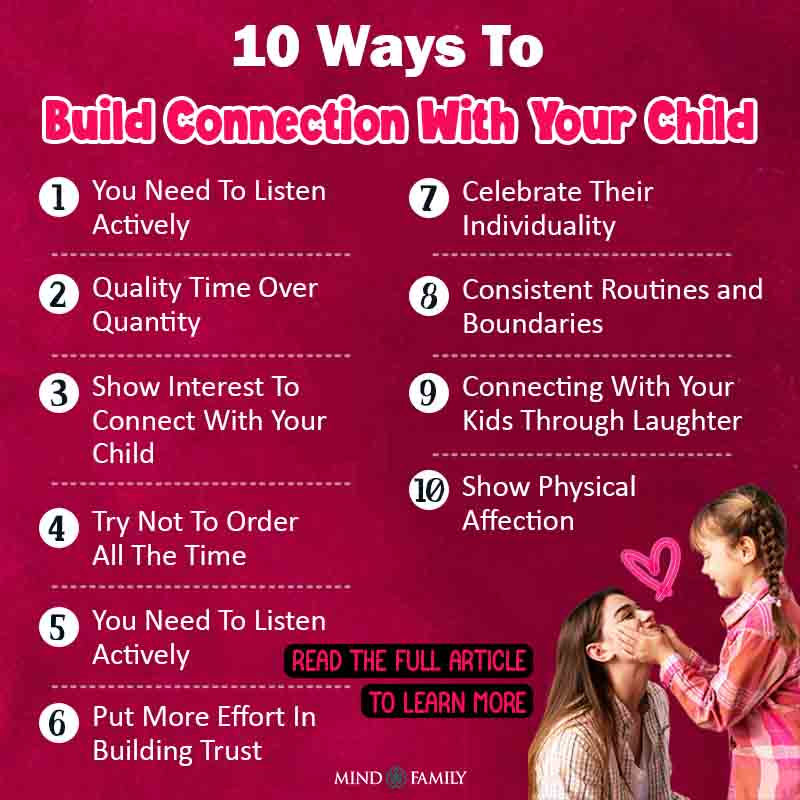Building a connection with your child is more than just spending time with them, it’s about understanding them. Don’t get me wrong, spending time with your kids is important. But are you just sitting down and watching TV while your child is playing games on your phone?
I’ve noticed a bunch of parents falling into this trap, thinking they’re doing the necessary just by being ‘around.’ This trend of ‘Sittervising,‘ where you’re kinda there but not engaged, might seem like a breeze, but trust me, it’s not the way to go.
If you’re looking to genuinely connect with your child you have to be emotionally present. Parenting is a whole lot more than just sharing the same air; it requires effort, real effort!
As a family counselor, I am writing this blog to tackle this very troubling issue. It’s time to go beyond just being present and understand what it takes to connect with our kids on a deeper level. So let’s begin!
Why is It Important To Connect With Your Kids?

While managing your Excel sheets and doing your laundry it’s easy to let precious moments with our kids slip through our fingers.
But here’s the thing: establishing a deep connection with our children is the bedrock of their emotional and psychological development. Building a connection with your child can help them in the following ways:
1. Connecting with Your Kids Builds Trust and Security
Dr. John Gottman, a renowned psychologist and author of “Raising an Emotionally Intelligent Child,” emphasizes the critical role of emotional communication in building a strong parent-child relationship.
According to Dr. Gottman, engaging in “emotion coaching” by recognizing, respecting, and validating children’s emotions not only fosters emotional intelligence but also nurtures a deep, empathetic connection.
2. Connecting with your child Opens Communication
Dr. Daniel Siegel talks about how important it is for parents to listen and understand their kids’ feelings. He calls this “attuned communication.” When parents do this, they make their kids feel safe and loved.
This helps kids grow a strong bond with their parents and teaches them how to handle their emotions better.
This allows kids to get a better understanding of their own and others’ feelings, which helps our children in socializing.
3. Supporting Emotional Intelligence
Dr. Karyn Purvis, who helped start the Institute of Child Development at Texas Christian University, has taught us a lot about how to be good parents and help kids grow up well.
She focused a lot on kids who have had hard times and found that “connected parenting” can help. Learning how to connect with your child is about ensuring kids feel safe, loved, and understood.
Dr. Purvis believed that when parents connect with their kids, especially those who have been through tough situations, it can help heal their hearts and minds. This kind of parenting helps kids trust more, feel safer, and be happier inside.
Her work shows that it can make a big difference when parents take the time to understand what their kids have been through and meet them with kindness and support. Connecting with your child is like building a bridge to the child’s heart, showing them they’re not alone and valued just as they are.
So, you see, taking the time to build a connection with our kids isn’t just about making happy memories; it’s about giving them the tools they need to thrive emotionally and socially.
With this foundation in place, let’s take a look at 10 helpful ways to build a connection with your child.
10 Helpful Ways To Build Connection With Your Child
Following are 10 helpful tips you can use to learn how to connect with your child:
1. You Need To Actively Listen
Active listening is more than just a skill; it’s an art form that, when mastered, can transform your relationship with your child. It’s about fully engaging with what your child is saying, both verbally and non-verbally.
This means putting aside all distractions and focusing solely on them. Show that you’re listening by nodding, making eye contact, and reflecting on what they’ve said to ensure you’ve understood correctly.
This level of engagement shows your child that their thoughts and feelings are important to you, encouraging them to open up more and share deeper parts of their lives.
Remember, active listening isn’t just about waiting for your turn to speak; it’s about truly understanding your child’s perspective.
2. “Quality Time Over Quantity”: Understand This!
It’s easy to get caught up in the misconception that more time equals better relationships. However, it’s not the amount of time you spend with your child but the quality of that time that counts.
Focus on creating meaningful interactions that allow you to genuinely connect. This could be a 15-minute bedtime story that involves cuddles and laughter, a half-hour walk where you talk about anything and everything, or a weekly special activity that you both look forward to.
These moments, though small, are the building blocks of a strong, enduring bond. They send a clear message to your child: “You matter to me.”
3. You Have To Show Interest To Connect With Your Child
Entering your child’s world can be a fascinating adventure. It’s about more than just showing a passing interest; it’s about immersing yourself in what you love. If your child is passionate about something, learn about it, engage in it with them, and let them see your genuine interest.
This might mean sitting down to play video games together, attending ballet recitals with enthusiasm, or even trying your hand at building a model airplane. When you engage in activities that matter to them, it not only makes them feel valued but also strengthens your bond in shared experiences.
4. Try Not To Order All The Time
Transforming your conversations from interrogations into open dialogues can work wonders for your relationship. Open-ended questions encourage more than a one-word response; they invite your child to think, reflect, and share.
These types of questions can lead to insightful conversations that help you understand your child’s inner world. For example, instead of asking, “How was school?” you might say, “Tell me about something interesting you learned today.”
This approach of connecting with your kids not only makes conversations more engaging but also helps your child develop their communication skills.
5. Put More Effort In Building Trust
Trust and respect are the cornerstones of any healthy relationship, and this is especially true when it comes to connecting with your child.
Demonstrating trust involves listening to their opinions, considering their feelings, and involving them in decisions that affect them. Respect is about acknowledging their individuality and treating them with the same courtesy you’d expect in return.
This foundation encourages open communication and mutual respect, making it easier for your child to come to you with their problems, knowing they’ll be taken seriously.
6. Understand The Power Of An Apology
Apologizing to your child when you’ve made a mistake is a powerful act. It shows them that everyone, even parents, can make mistakes and that it’s important to take responsibility for our actions.
A sincere apology can teach your child about humility, integrity, and the value of maintaining healthy relationships. It also models how to handle mistakes gracefully, a lesson that will serve them well throughout life.
Remember, apologizing doesn’t diminish your authority; it reinforces your humanity and deepens the trust between you and your child.
7. Celebrate Their Individuality
Every child is a unique individual with their own set of interests, abilities, and quirks. Celebrating this individuality means more than just acknowledging their differences; it means embracing them wholeheartedly.
Encourage your child to pursue their interests, even if they’re different from your own, and celebrate their successes, no matter how small.
Accepting and valuing your child for who they are builds their self-esteem and helps them feel secure in their identity. It helps in connecting with your kids.
8. Consistent Routines and Boundaries
Consistency in routines and boundaries gives children a sense of security and predictability in their lives. Establishing a daily routine helps them understand what to expect, reducing anxiety and stress.
Similarly, clear boundaries provide a framework for acceptable behavior, helping children navigate their choices and actions. While consistency is key, it’s also important to be flexible and understanding, adapting to your child’s changing needs.
Balancing consistency with flexibility shows your child that you care about their well-being and are responsive to their needs.
9. Connecting With Your Kids Through Laughter
Laughter is a universal language that can instantly lighten the mood and bring people closer together. Sharing a laugh with your child can break down barriers, ease tension, and foster a sense of camaraderie.
It’s about finding joy in the small things, whether it’s a silly joke, a funny face, or a comical situation.
These moments of shared laughter create lasting memories and reinforce your bond, reminding you both that, despite life’s challenges, there’s always room for joy and lightheartedness.
10. Show Physical Affection
Physical affection is a powerful way to convey love and security to your child. A hug, a gentle touch on the back, or a cuddly bedtime can communicate your love in a way words cannot.
It’s important to be mindful of your child’s comfort level and respect their boundaries, but don’t underestimate the value of a loving touch.
This physical connection can be especially reassuring during difficult times, providing a tangible sense of comfort and security.
Remember, building a connection isn’t just about praising the result; it’s about acknowledging the effort, perseverance, and progress along the way.
Patience is perhaps one of the most challenging yet rewarding virtues to practice in parenting. Building a connection with your child takes time, understanding, and a lot of patience. There will be ups and downs, misunderstandings, and setbacks, but each of these challenges is an opportunity to grow closer.
A Word From Mind Family
Building a connection with your child is not just about being around them; it’s about spending quality time together and understanding each other.
In a world where we’re often busy and distracted, it’s super important to make time for our kids and listen to them. Whether we’re playing together, talking, or just laughing, every moment we share helps us grow closer.
Building these connections isn’t always easy, but it’s worth it. It takes patience and love, but every effort we put in brings us closer to our kids.
So, let’s keep working on these connections, keep enjoying our time together, and keep showing our kids how much we care about them.
Frequently Asked Questions (FAQs)
1. Why is it important to connect with your kids?
It’s crucial to connect with your kids because it builds trust, opens communication, and supports their emotional intelligence and well-being.
2. How to build a connection with your child?
You can build a connection with your child by actively listening, spending quality time together, showing interest in their interests, and fostering trust and respect.
3. What is Sittervising?
Sittervising is being physically present but emotionally distant, like watching TV while your child plays on your phone, hindering genuine connection and engagement.















Leave a Reply